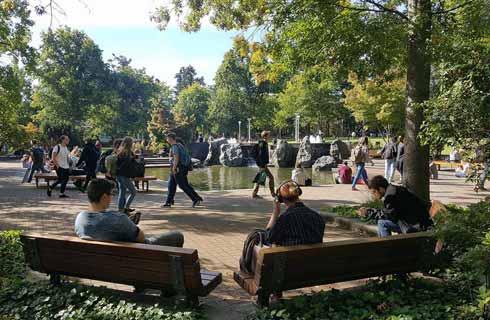心理学博士/硕士
PhD/MPhil Psychology

学历文凭
Ph.D.

专业院系
Department of Psychology

开学时间

课程时长

课程学费

国际学生入学条件
IDP—雅思考试联合主办方

雅思考试总分
7.0
- 雅思总分:7
- 托福网考总分:60
- 托福笔试总分:160
- 其他语言考试:Cambridge ESOL CPE (Certificate of Proficiency in English) at grade C or above.
CRICOS代码:
申请截止日期: 请与IDP联系 以获取详细信息。
课程简介
The Psychology PhDMPhil offers you the chance to develop a substantial and original body of new research involving the discovery of new facts or through the reformulation of existing frameworks. You will join an established department with a history of pioneering research. We have a commitment to the traditions of the discipline and a clear vision of good research practice in Psychology.We support a vibrant community of researchers and provide expert supervision on a range of specialist subjects. Current strengths include cognitive neuroscience, decision making and behavioural economics. Formal modules in advanced research methods are available if needed to provide you with understanding needed to advance your research.Our purpose-built facilities include:Two state-of-the-art electroencephalography laboratoriesA transcranial magnetic stimulation laboratoriesA baby laboratoryBehavioural laboratories with access to eye-trackersPsychophysiological recording suitesA psychometrics test library.You and your research will become an integral part of our dynamic research culture.
相关申请
 预科
预科 奖学金
奖学金 实习机会
实习机会 在校学习
在校学习 跨境学习
跨境学习 校园授课-线上开始
校园授课-线上开始 在线/远程学习
在线/远程学习
开学时间&学费
学费信息仅供参考,请与IDP联系以获取详细信息
| 开学时间 | 时长 | 学费 | 地点 |
|---|
学校排名

世界排名351
数据源:
泰晤士高等教育世界大学排名
关于伦敦大学城市学院

伦敦大学城市圣乔治是一所一流的多学院大学,拥有一个由来自170多个国家的2.7万多名学生组成的多元化学生群体。该校在克勒肯维尔、穆尔盖特和图庭都设有校区,是英国首都规模最大的高等院校之一,也是为伦敦医疗保健行业贡献最多人才的院校之一。在''2023年卓越教学框架''评估中,该校获得了整体''白银''奖,并在毕业生前景方面获得''黄金''评级,这也是该校特别注重提高学生就业能力、致力于帮助学生取得成功的有力体现。该校开设有艺术与社会科学、健康与医学科学、数学、计算机科学、工程学、法律以及商业学科领域广泛的本科和研究生课程供学生选择。伦敦大学城市圣乔治投入了大量资金建造世界一流的设施和最先进的设备,为开展跨学科开创性研究提供支持。该校因卓越的研究而闻名:在''2021年卓越研究评估框架''中,该校提交的86%的研究被评为''世界领先''(4*)或''国际优秀''(3*)水平。伦敦大学城市圣乔治提供广泛的支持服务、最先进的设施以及丰富的活动,令学生受益无穷。该校在伦敦中部和南部设有校区,提供充满活力的学习环境,让学生度过充实的学习和社交生活。在《完全大学指南》(Complete University Guide,2026年)中,伦敦大学城市圣乔治的毕业生前景名列英国前15位。毕业生将成为由全球17.5万多名校友组成的蓬勃发展的校友网络的一员,并将免费享有终生会员资格。注意:这里提到的一些排名是在伦敦大学城市学院与伦敦大学圣乔治学院于2024年合并之前分别获得的排名。
本校相关课程

社会学(包括犯罪学,媒体和传播以及食品政策)博士/硕士
学历文凭
Ph.D.
开学日期
课程费用总额


心理学博士/硕士
学历文凭
Ph.D.
开学日期
课程费用总额


精算学博士学位
学历文凭
Ph.D.
开学日期
课程费用总额


金融学博士
学历文凭
Ph.D.
开学日期
课程费用总额


管理,市场营销和运营管理博士学位
学历文凭
Ph.D.
开学日期
课程费用总额


音乐博士/ MPhil
学历文凭
Ph.D.
开学日期
课程费用总额

其他相关课程

MPsych高级心理学
 普利茅斯大学
普利茅斯大学泰晤士高等教育世界大学排名:590
学历文凭
Undergraduate Masters
开学日期
课程费用总额


心理学硕士(临床)
 南昆士兰大学
南昆士兰大学学历文凭
Masters Degree (Research)
开学日期
课程费用总额


心理科学学士
 迪肯大学
迪肯大学泰晤士高等教育世界大学排名:206
学历文凭
Bachelor Degree
开学日期
课程费用总额


MSc Business and Organisational Psychology (with Professional Experience)
 考文垂大学
考文垂大学泰晤士高等教育世界大学排名:637
学历文凭
Masters Degree (Taught)
开学日期
课程费用总额


Postgraduate Diploma in Arts - Applied Behavioural Analysis
 奥克兰大学
奥克兰大学学历文凭
Postgraduate Diploma
开学日期
课程费用总额


保护和灵长类动物行为-理学硕士
 肯特大学
肯特大学泰晤士高等教育世界大学排名:482
学历文凭
Masters Degree (Taught)
开学日期
课程费用总额










